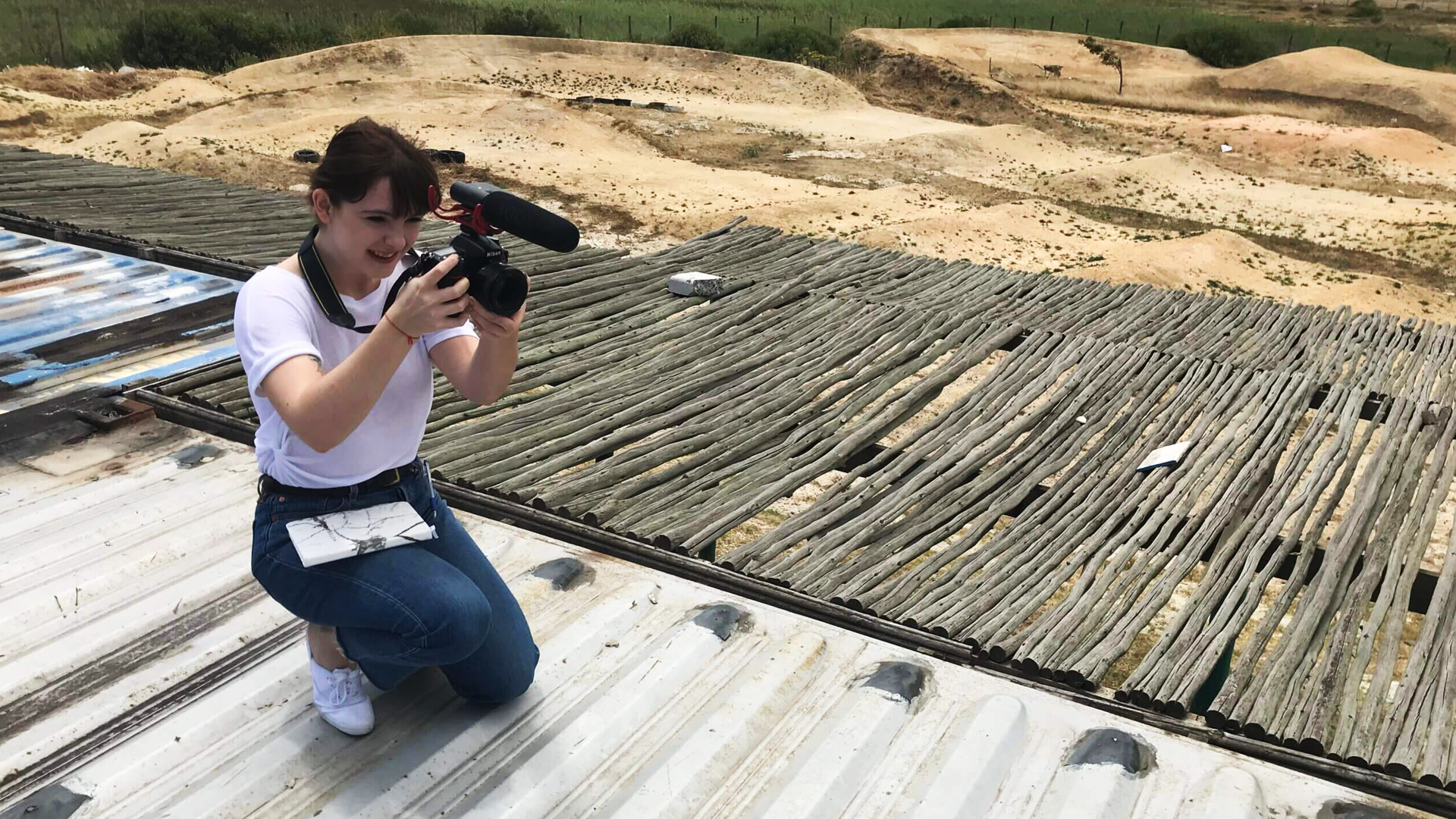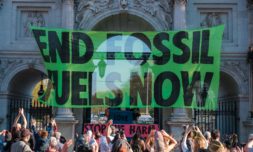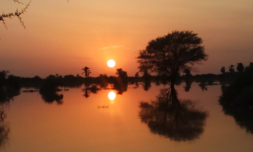Thred: Our Editor had the chance to speak to you last year about the process of making your documentary, The Sunrise Storyteller. I’m curious to know how things have changed for you career-wise in the last year since then, (i.e. what you’ve seen and learned) as you continue to highlight the link between climate and social issues through film.
Kasha: Last year, I was attending COP26 while working on my documentary film 1.5 Degrees of Peace. It was my first production shoot out in the field. At that time, it was really hard to find the links between the climate crisis and conflict in the Blue Zone [of COP]. This year, we’re seeing a lot of that change in terms of the recognition of the inextricable link between the two, and that’s positive.
I’m still continuing to follow the stories of young people who are bridging those two movements between peace and climate justice together. And in 2023, we’re still looking at continuing production of the film. So not much has changed in terms of my own career, but a lot has changed in terms of the conversations that are happening around these issues – and that’s some good news.
Thred: Could you share with us something or a few things that you’ve witnessed during the filmmaking process that have been most impactful to you?
Kasha: Absolutely. What I feel is most crucial in telling stories about the climate and making films, is highlighting the beauty and diversity of our natural ecosystems in a way that creates a sense of awe and wonder for nature.
We have to have this instinct to protect our natural environment because we are part of our natural environment. We are not existing above nature.
We are one part of the ecosystem, and we are throwing our whole ecosystem out of whack with our actions. So we really have to be mindful about the way that we interact with nature, and I think that that comes with storytelling. As well as the way that we think about ourselves in relation to nature and the way that we view our natural environment.
So that’s one thing that I’ve definitely been focusing on when it comes to biodiversity. One thing that has also been profoundly impactful on me in learning about these issues and the interconnections between these issues has been the power of people to mobilize, to protect the rights of nature.
There are campaigns like Stop Ecocide International, which are trying to get the International Criminal Court of Justice to recognize that the destruction of our natural environment should be an international crime. We should not have the right to take from nature endlessly and extract from nature as if it won’t have any consequences. During the filmmaking process and being here at COP, I’ve learned that we have a duty to protect and preserve our natural environment.
If we have such a power to create negative change, we have such a power to create positive changes as well.

Thred: Today at COP, leaders are discussing how to harness the power of natural ecosystems to mitigate climate change. Are there any instances where you’ve seen local communities working with nature instead of against it in order to solve climate-related challenges?
Kasha: I think that a lot of the conversation around climate change, mitigation and adaptation often circles back to technology. But oftentimes that’s not really the answer that’s going to get us out of this system we’ve created.
We need to look at nature-based solutions to the climate crisis, and that comes with listening to and centring Indigenous voices and Indigenous leadership.
Indigenous Peoples are responsible for preserving about 80% of the world’s global biodiversity. They’re experts in living in harmony with nature and leading solutions that are nature-based in all senses of the word. Oftentimes oil extraction projects and resource extraction projects are happening in their natural environments, disrupting biodiversity, disrupting ecosystems, and disrupting their ways of life. I think that Indigenous leadership absolutely has to be at the centre of it all. That’s something that I’ve been learning a lot about the past year.
Thred: Have you seen Indigenous voices being represented at COP27 more so than last year? How would you compare it?
Kasha: There’s definitely more of an effort from the side of civil society to centre the voices of indigenous peoples. A lot of the negotiation spaces, which civil society or observers don’t really have access to, are dominated by men typically of a certain economic status or background.So there’s a lack of diversity in terms of negotiations. But the civil society presence here is really trying to make it front and centre. They want to make sure that we don’t lose the voices of indigenous people in this conversation and continue to incorporate them in decision-making processes. People are definitely advocating for it.
Thred: In your new documentary trailer, you focus a lot on eco-anxiety, and I know that young people who are concerned with the state of the planet feel exactly the same. Do you have any advice for managing those feelings?
Kasha: I think when it comes to managing your thoughts and feelings around this intense crisis, people should honour their feelings instead of trying to push them away. It’s natural to feel overwhelmed or frustrated or scared for the future or for the present. As people are already experiencing the climate crisis, it’s not just a future reality.
Sometimes the conversation around eco-anxiety centres around consequences in a future reality when it’s very much a present-lived experience.
One thing that keeps us grounded – or keeps me grounded – is a connection to community, a connection to people who care about the same issues that you do, and who are trying to change them. Seeking out that community and that support from your peers can be super valuable and helpful. It helps to manage and talk about those emotions that can be really distressing. So finding support and friendships and connections. It gives you the motivation to keep going as well, I think.

Thred: I can imagine that telling these stories and showcasing social and environmental issues is a hugely cathartic experience, because you are really part of making a change. I wonder if it has become an outlet for you?
Kasha: Absolutely, yeah. That’s so true. I think throughout the past year, although not much has changed career-wise, a lot has changed in terms of me finding a sense of community with people who I feel really understand what I’m passionate about. We support each other no matter what, and we’re always there to call on each other if we need to. We cheer each other on. I think that that’s super uplifting. It definitely helps me cope with feelings of anxiety or overwhelm.
Thred: As we near the final days of the summit, how hopeful are you that policies are going to be agreed upon to limit the effects of global heating going forward?
Kasha: Not to take it to a little bit of a downer, but I’m not a hundred percent positive about the outcome.
The Global North countries are not committing to stopping the expansion of fossil fuels for oil and gas extraction, which is one of the key things we need in order to stop us from surpassing our 1.5 degree limit. Still, the language around the conference focuses on the 1.5 degrees being the target, when it’s really a limit that we should not surpass. We have to stay below that target. That’s why the Paris Agreement exists, because we have that cap that will prevent us from seeing far greater climate disasters and impacts affecting people on a massive scale.
We need to change the way we view a global temperature increase of 1.5 degrees Celsius as a target because this risk takes away some of the accountability.
If we say ‘target’, it’s like, ‘oh, we tried, but we missed it.’ You know, you can always be a little bit off from the target, but we really do have to think about it in terms of this is the threshold and we can’t surpass.
I also would like to see more commitment to loss and damage funding., I believe that Tuvalu, one of the Pacific Island Nations committed to, the fossil fuel non-proliferation treaty.
That’s something that I would love to see get more momentum within the governments who are here. There’s some progress, but a long way to go as well.
Thred: To end on a high note: what can we look forward to seeing from you in the future? Are there any specific topics you hope to hone in on through your work, that maybe you haven’t had the chance to yet?
Kasha: I wish I could say that I had more for people to look forward to other than just this one film, but the filmmaking process is so intensive and long-term that we’re still looking at it being completed by next year.
I hope that we can celebrate the launch and that people can see the stories of young people who are bridging movements and who are looking at and living with the intersections of peace and climate justice. That’s the one thing I really am looking forward to sharing with everybody.
In terms of the future, I think I’m always going to use storytelling as a tool to uplift the stories of young people or people who are at the grassroots level of making transformational change. So that that’s my lens. I really want to showcase stories in a way that motivates people to act.
In conjunction with the film’s release, we’re going to be developing policy calls to action, social calls to action, and resource guides for young people to actually get involved in once the film is out. This will hopefully help viewers find out how they can personally take action, to start making those connections for themselves and find that community in this unified movement for peace and climate justice.























